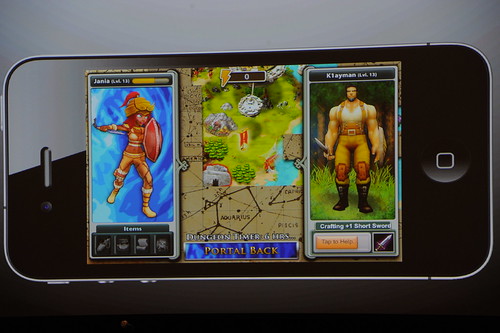Trending
Opinion: How will Project 2025 impact game developers?
The Heritage Foundation's manifesto for the possible next administration could do great harm to many, including large portions of the game development community.
Over the past few years, there's been a huge paradigm shift in the mobile gaming world. Originally, the mobile games of yesteryear had been simple graphics and text, but now, developers are able to render fully detailed worlds, capable of user interaction

Over the past five or six years, there's been a huge paradigm shift in the mobile gaming world. This came with the evolution of mobile technology. Originally, the mobile games of yesteryear had been simple graphics and text, but now, developers are able to render fully detailed worlds, capable of user interaction.
As the industry progresses toward an unknown future, what will be next? Here are a few of the game-changing emerging trends happening throughout mobile gaming.

Image via Flickr by Official GDC
Some developers have realized that they won't turn a profit releasing a mobile game, so they have developed game that are ostensibly free to play. The game will then be supported by ads or additional content, which the user will pay for. A great example of this would be Candy Crush Saga. This game is completely free to play, but is supported in some capacity with ads.
In the case of Candy Crush Saga, ads for the game will appear inside other games by the same developer. If you run out of lives, you can wait until you get more, or for the impatient people, you can purchase more for only a dollar. While it seems silly and you think you can wait, it's not always easy. Many people impulse buy these because it's only a dollar, and before they know it, they've spent a ton of money.
Microtransactions abound in both mobile and console gaming. They're very similar to paying to advance, but in this case, the microtransaction can give you access to a weapon, level, or other item that you wouldn't otherwise have. In some cases, developers are taking advantage of many people's impatience and offering a microtransaction as a means to get an item in the game that they wouldn't normally get until much later in the game. This gives the player an early advantage or it expediates some reward that would otherwise be gained through a long and obnoxious grind (just think of how crafting in World of Warcraft Works, for example).
Microtransactions are proving to be a huge seller, and even the largest of companies are getting in on the action. This helps companies tremendously because with advancement in technology comes higher development costs.
While online play has been around for console games for quite some time, it's something fairly new to mobile games. Playing over a cellular network isn't ideal, so make sure you're connected to a Wi-Fi network before playing online. If you're playing with someone near you, you can connect to them via a Bluetooth connection. Due to the nature of the technology, mobile gaming usually only supports two to four players, but that will change in the future.

Image via Flickr by David Guo
For some people, they want their activities to be private, whether it's while gaming or otherwise. Other people, however, don't care, and can't wait to share how badly they beat you at Blackjack on JackpotCity. Developers are taking advantage of that and users are increasingly logging in through social media networks like Facebook and Twitter. The game will post updates to your friends if you allow it. Some games will prompt you to share the game before advancing further (a fairly shrewd marketing tactic that was, no doubt, influenced by Zynga).
Taking it a step further, some games now task you with challenging your friends. These challenges could potentially unlock something new in the game for you if you successfully beat their score. Whether you like it or not, social games are here to stay.
One of the best things about mobile games is that they're easy to develop. With consoles, an idea can only come to life when the big-wigs deem it so and pour millions of dollars into the project. With mobile gaming, anyone with an idea can make it come to life if they know how. Games like Candy Crush Saga and Jetpack Joyride, both of which are huge successes, were originally developed by companies that would've had no chance of developing for a console platform. By releasing games for cheap (or free), these small developers are proving that their ideas are worth gold, even if a company wasn't willing to invest in the game.
Some companies have spun a tiny game into an empire. Zynga, for example, creators of Words with Friends, focused solely on mobile development. This was a smart move, and now their company is worth an estimated $1.14 billion dollars. Hundreds of games and apps are being created every day.
All of these trends lead up to a mobile platform that's set to overtake console gaming in the near future in terms of users. By supporting games with ads and microtransactions, developers can get a build a huge "install base" while funding future projects. With millions of people currently using smartphones, mobile gaming isn't going anywhere any time soon. What's your favorite mobile game?
Read more about:
BlogsYou May Also Like